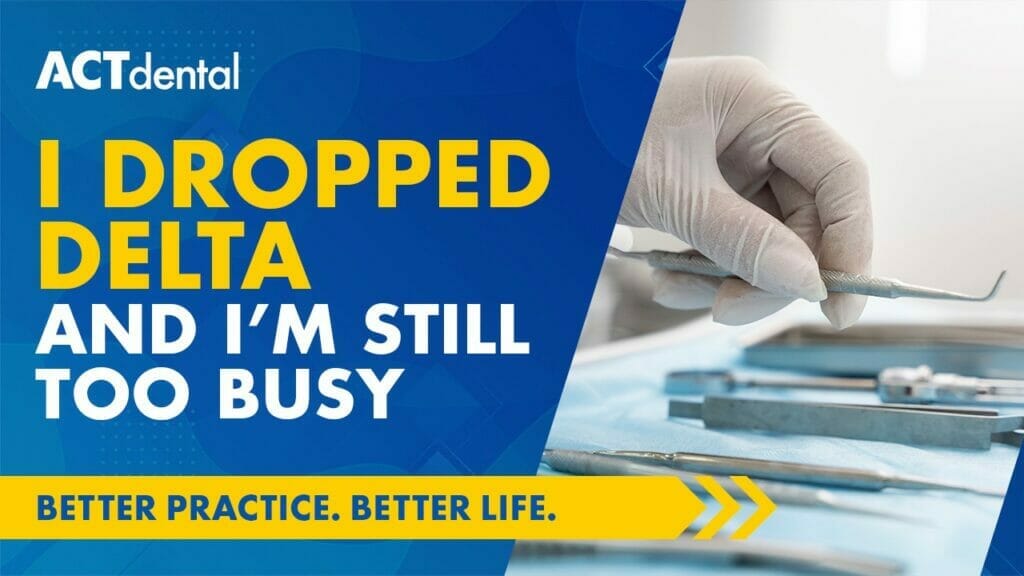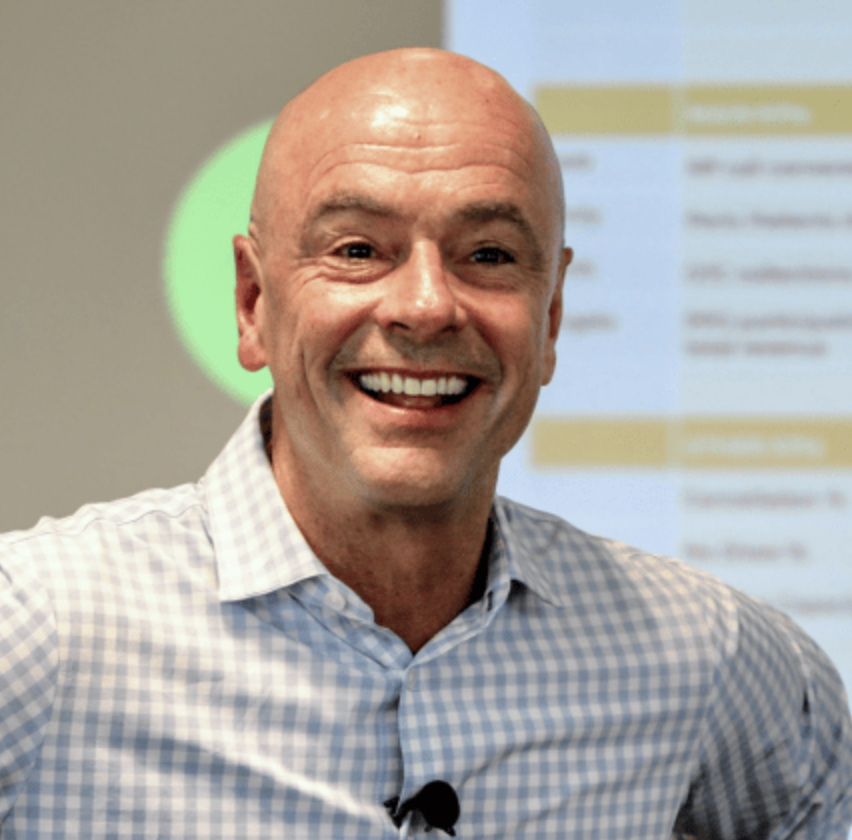Like me, I’m sure many other dentists have been struggling under the yoke of PPOs. At the beginning of each year, we look back on the previous year and see the numbers showing exactly how much money you wrote off—all the work you did that you’ll never be paid for. At some point, you have to say, “Enough is enough” and start getting paid for what you’re doing. For me, that was a day when I did about three hours of posterior composites and then wrote off 55% of what I’d done to Delta. I worked so hard for those composites, and it was absolutely crazy that my hourly wage ended up being less than what my hygienists were producing. I was working too hard, writing off too much, and was way too busy, so I met with my team and decided to make the change to drop Delta Dental last year. It was a drastic, terrifying change, but you know what happened? I’m still too busy, but at least I’m now getting paid for my work.
It’s Within Your Reach
I would tell everyone who’s thinking about dropping Delta or another PPO to do it and never look back because it’s been such a positive experience for me. Dentists like to focus on all the negative things that could happen, which I did, but now I wish I’d made the change years ago. One of the most powerful things Kirk told me about PPOs was this: “Pick one out of every four days—you’re working for free that day.” It’s a horrifying concept when you actually sit down and think about it—you’re not getting paid 25% of the time when you’re writing off so much to PPOs. Dropping your PPOs isn’t an unattainable goal—it’s something you can feasibly achieve, but it takes work. Thankfully, ACT Dental created a free resource to help with this situation: the PPO Roadmap, which gives you a step-by-step method of identifying and dropping your worst PPOs.
Preparation Equals Better Success
I learned a lot from my experience, so before you get going, I recommend you think about the following points:
- Believe in yourself. I think most people don’t move forward on this journey because they lack the confidence that they can do it. They get too hung up on the idea of people leaving, which prevents them from doing something amazing.
- Value what you do. The main reason for dropping PPOs is to be paid what you deserve instead of writing off a large percentage of your work. When you work hard, you should be paid for what you do, so the sooner you focus on the value you provide, the sooner you can start improving the situation.
- Get your brand right. For me, my brand is that I’m going to treat my patients like my family. My patients know that, and it’s one of the reasons they come to me. If you’re going to drop PPOs, you must have a brand of your own and believe in what you do, because you need to offer a service that goes above and beyond the usual and customary.
- Understand that patients will leave, but that’s okay. According to research, about 20% to 30% of Delta patients will probably leave you. However, even if you lose 30%, you’re still going to net even because you’re no longer writing off so much.
- Stay flexible. The system will evolve as time passes, and you’ll need to adapt. I didn’t know what to expect at first, but we managed to make do in those first few weeks. It just takes time to find your footing.
The first step you should take is to meet with your team and take a close look at your practice. Think about:
- What makes your practice special?
- Are you and your team ready for this?
- How many patients will this affect?
Numbers are always helpful because they remove all emotion from the situation. In my practice, we had a total of 2,400 patients, 950 of which were Delta patients. I knew it was possible we’d lose up to 30% of those patients, or roughly 300. It sounds like a lot, but because of how much we were writing off for those patients, I knew we’d still be fine with 2,100 patients.
Sending the Letter
Once you’ve made up your mind and have informed the insurance company of your intention, you have to take one of the most difficult steps: letting those patients know you’re no longer going to be in-network with their insurance. It’s important to send them a letter that explains why you’re doing this, while at the same time addressing their concerns and answering their questions. The main points of the letter I sent were:
- I believe in quality care and a customer service and relationship-based practice
- We offer awesome technology and an awesome team approach to giving care
- We have a great set of employees I value and love
- I’m trying to carry forward my dad’s and uncle’s legacies
- I hope you can understand why we had to make changes
- Yes, you can still come here
- Yes, we will still offer the same, if not better, care to you
- Yes, you can still use your benefits
- It will cost more money and you’ll have to pay upfront, and then the insurance will reimburse you directly
- We’re happy to answer questions or run numbers for you
- We are ready and waiting to have a dialogue with you
I’m happy to make my letter available to anyone who would find it useful—feel free to use parts of it or even copy it verbatim. Simply reach out to me and I’ll gladly send you a copy!
The reaction to this letter ended up being something of a mixed bag, as we had some patients that dropped us right away, but there was also a surprising amount of positive feedback. The idea of paying higher prices upfront was understandably difficult for some, but so far, we’ve only lost 60 or 70 patients—of those, I’ll really only miss maybe five or six. The patients who left immediately were the ones who didn’t share our values and finally saw an excuse to leave, so I’m not too upset to lose them.
What Now?
It’s absolutely amazing to me now, because I can look at the reports and see that I’m not writing off $3,500 a day to Delta. What’s more, I’m probably going to need to hire an associate because I still have too many patients and am too busy! Dentists are always terrified that they’ll lose all their patients if they drop PPOs, but I can tell you that’s not the case. When your patients understand the value you bring that they can’t get somewhere else, they’re willing to pay for it. We’re currently working to brainstorm ways to go above and beyond the usual and customary for our patients because I feel we need to step up our game in response to the patients paying more. It’s all about increasing the value for them because, without it, they’re going to walk.
None of this would have been possible without ACT Dental, because they led me in the right direction and gave me the support and confidence I needed to transform my life and my practice. I don’t believe in ego and take no credit for any of my successes—I’ve had so many incredible mentors who helped me along the way. Download ACT’s free PPO Roadmap for a step-by-step guide that will show you how to break away from the PPOs that are draining your energy and money. For a hands-on approach, schedule a call with them today and let their coaches do for you what they did for me—help me to create a Better Practice, and a Better Life!
My life’s purpose is to share and make others better, so please reach out to me with any questions.
Dr. Kevin Groth is a former ACT Dental client, current Adjunct Faculty member, and owner of Groth Dental
Kirk Behrendt
Kirk Behrendt is a renowned consultant and speaker in the dental industry, known for his expertise in helping dentists create better practices and better lives. With over 30 years of experience in the field, Kirk has dedicated his professional life to optimizing the best systems and practices in dentistry. Kirk has been a featured speaker at every major dental meeting in the United States. His company, ACT Dental, has consistently been ranked as one of the top dental consultants in Dentistry Today's annual rankings for the past 10 years. In addition, ACT Dental was named one of the fastest-growing companies in the United States by Inc Magazine, appearing on their Inc 5000 list. Kirk's motivational skills are widely recognized in the dental industry. Dr. Peter Dawson of The Dawson Academy has referred to Kirk as "THE best motivator I have ever heard." Kirk has also assembled a trusted team of advisor experts who work with dentists to customize individual solutions that meet their unique needs. When he's not motivating dentists and their teams, Kirk enjoys coaching his children's sports teams and spending time with his amazing wife, Sarah, and their four children, Kinzie, Lily, Zoe, and Bo.
RECENT POSTS
876: The Kois-Coachman Digital Dentistry Event & The IntraOral Scanner Festival – Dr. Christian Coachman
April 18, 2025
Rest Isn't A Reward, It's A Requirement!
April 14, 2025
Data Snapshot: # of Office Days Open
April 11, 2025
Weather Any Storm: The Power of Focus
April 07, 2025
871: Metric Mondays: Gross Profit Percentage: The Health Indicator of Your Practice – Dr. Barrett Straub
April 07, 2025
Embrace Conflict to Unlock Trust
April 04, 2025

